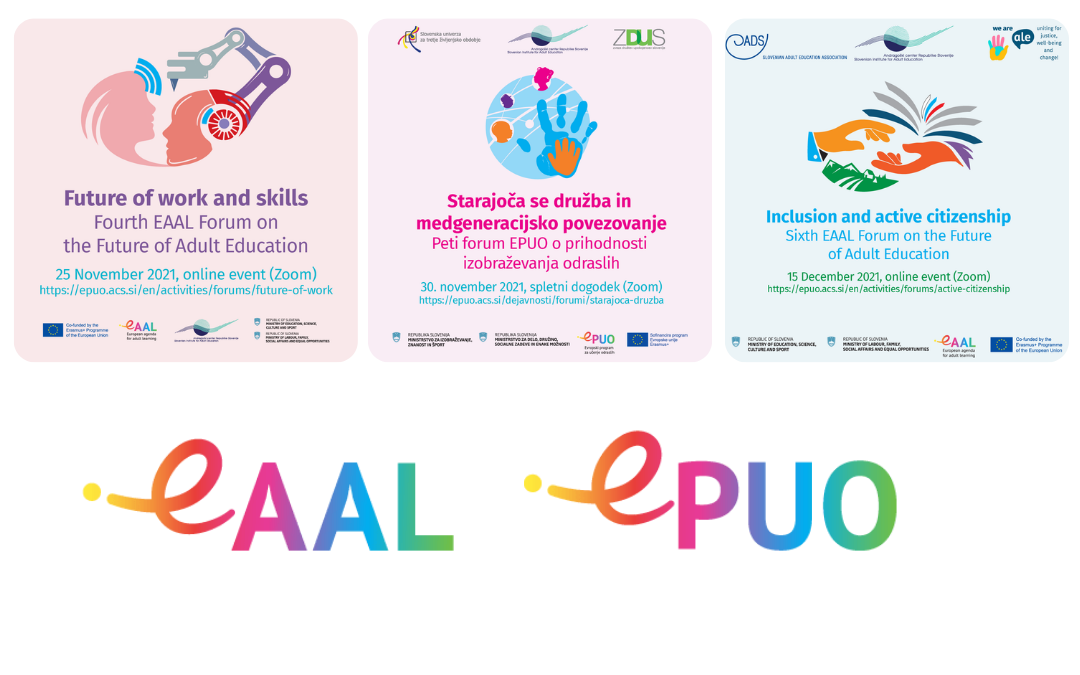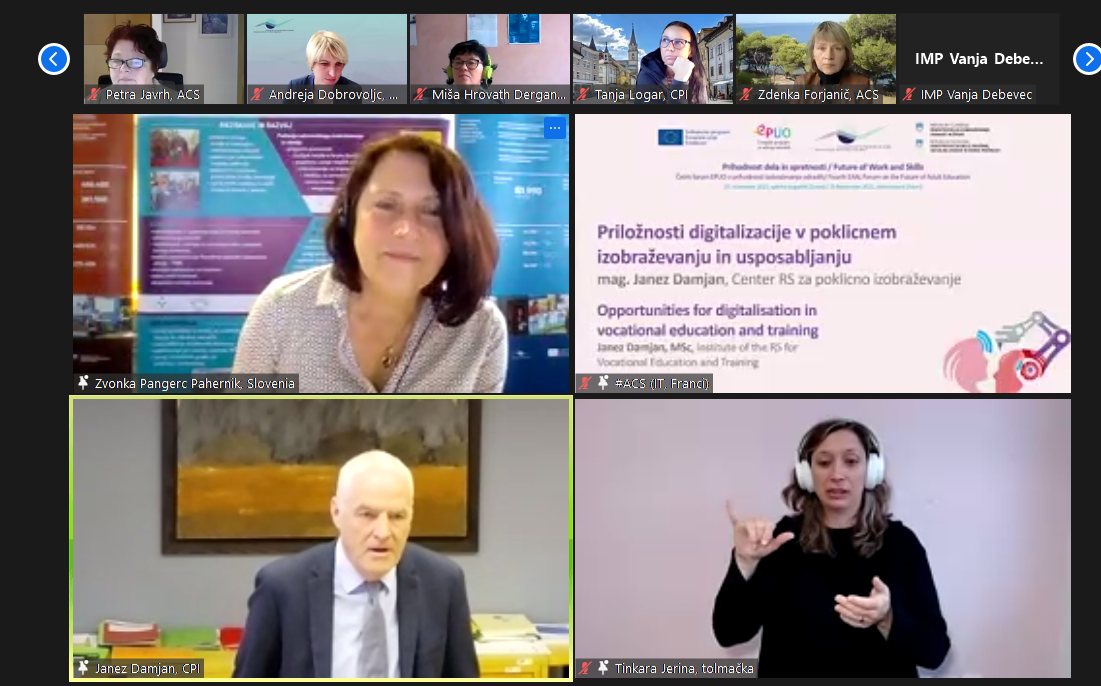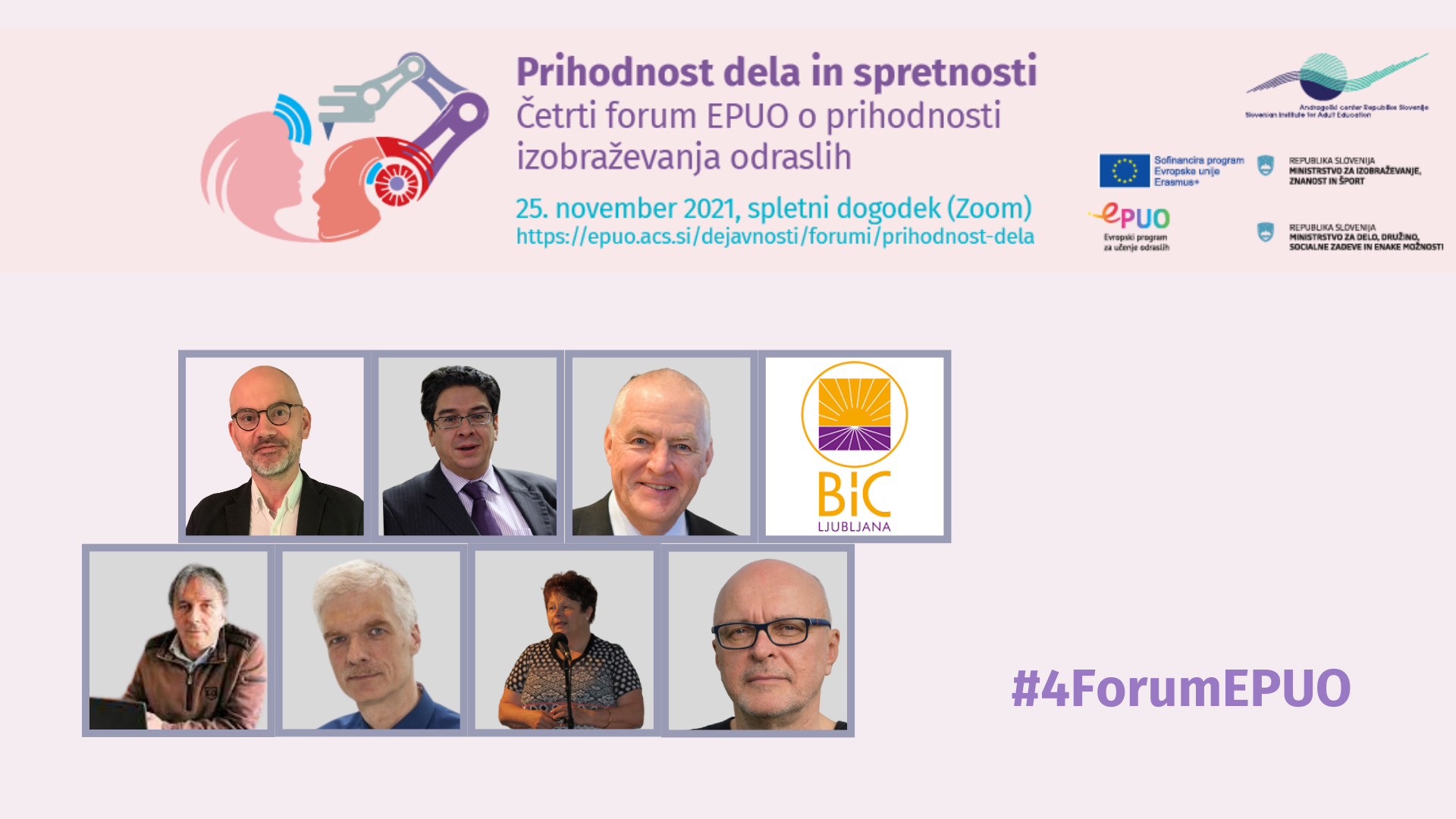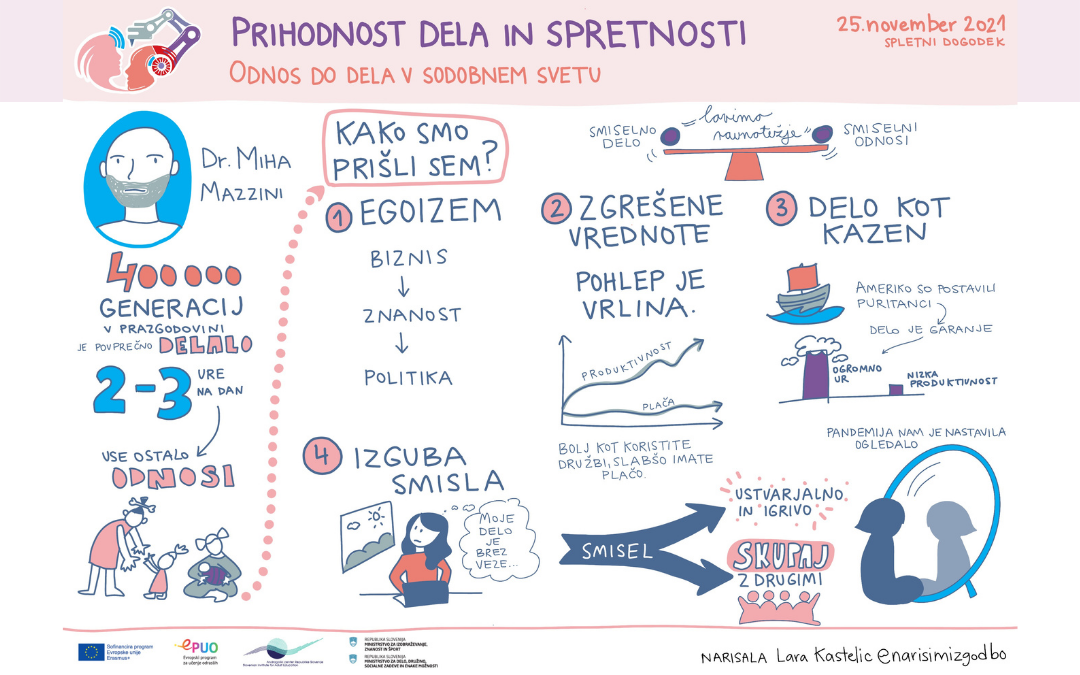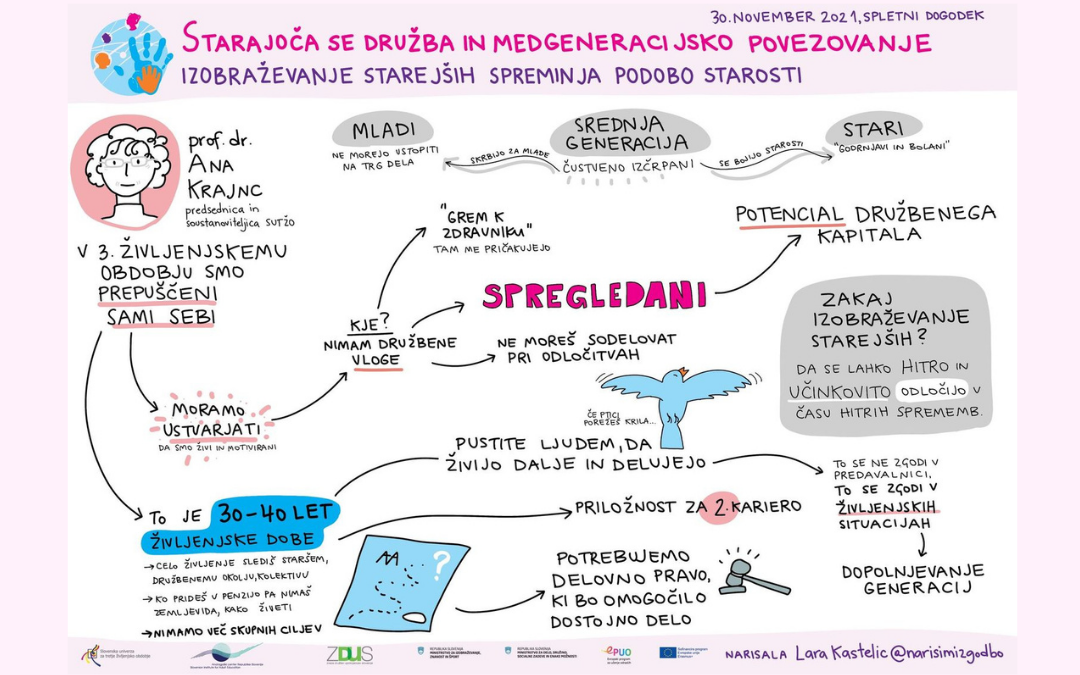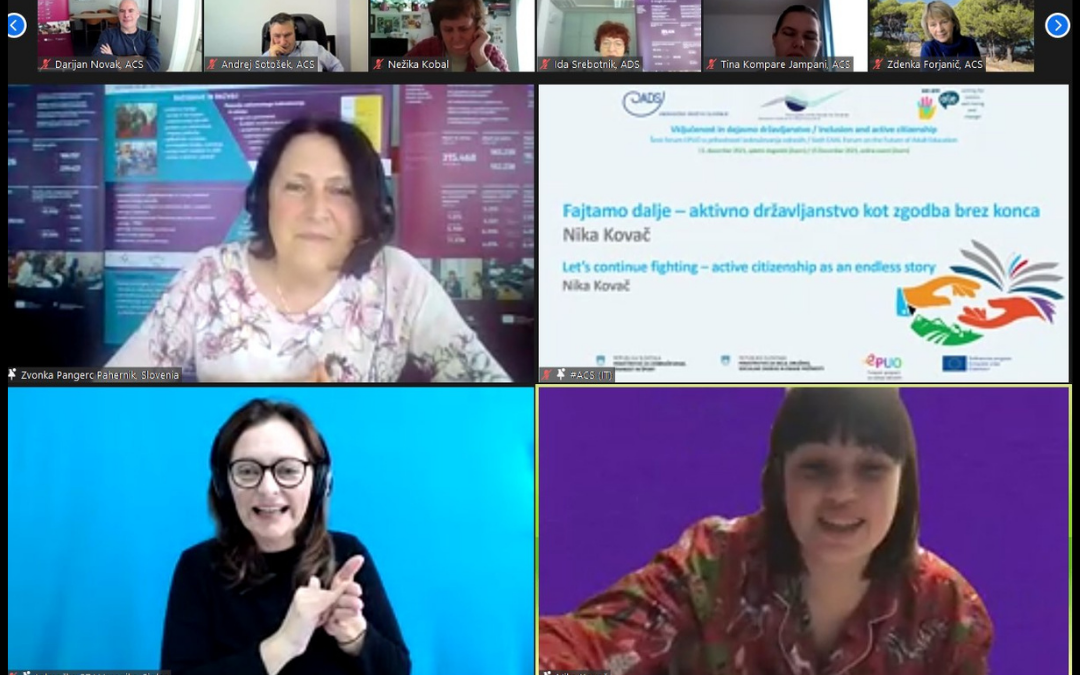With the forums on the future of adult education, we have linked education with different social processes. We present you the final three forums.
During the process of implementing the European Agenda for Adult Learning in Slovenia (EAAL Project), we planned six forums in the period 2020–2021. We aligned them with the socio-economic challenges first presented at a prominent event of the European Commission – Forum on the Future of Learning (2019, Brussels).
At the EAAL forums, we intended to examine the role of adult education and lifelong learning in each of the listed trends and processes. Due to COVID-19, we were forced to postpone all events to 2021, which meant a considerable organisational issue. On the other hand, some advantages have emerged. We were establishing partnerships to a greater extent, shared burdens and thus broadened content and perspectives. We have hosted many high-profile speakers and learned about many examples of good practice. We invited an expert, usually a social scientist, to each forum, to reflect on the concrete challenge and, within it, on learning and education, from a humanistic perspective in the concluding part.
We set up a website for each event and published videos of the entire event and individual performances. The forums also feature graphic harvests, transcripts from the chat room testifying to the lively engagement of the participants, and other sources. From the second forum onwards, we included Slovenian sign language interpreting, and in the case of forums with an international cast (all except the first and the fifth) also translation into Slovenian and English, respectively. COVID-19 has enabled greater participation due to the event being held online, while at the same time permanent availability of recordings and other materials.
The relatively tightly scheduled of EAAL forums have made it very clear that these are not six separate socio-economic challenges, but that they are intertwined. Consequently, comprehensive approaches are necessary when dealing with them. Lifelong learning is essential in this process!
In 2021, we organised a total of six EAAL forums and presented the first three individually in the Spring, Summer and Autumn edition of the SIAE Newsletter. Here we are presenting an overview of the last three EAAL forums.
Adult education is not just a stakeholder, but a driving force in skills management.
This was stated by the first speaker at the fourth EAAL forum, on 25 November 2021, where we discussed the future of work and skills. Jasper Van Loo, PhD from Cedefop talked about processing large amounts of data about the offer and the needs – both in terms of jobs and skills – with a variety of tools, from simple to sophisticated. In this way, they establish a knowledge base about skills or the so-called skills intelligence, which enables the definition of the current situation as well as the forecast of trends. His interlocutor in establishing a career platform for short- and long-term forecasting of the situation on the labour market in Slovenia was Gonzalo C. Caprirolo, MSc from the Ministry of Labour, Family, Social Affairs and Equal Opportunities. In his contribution, he elaborated on these efforts.
Janez Damjan, MSc from the Institute for Vocation and Training analysed digitalisation in VET in more detail. He noted that during COVID-19, the most problems arose with on-the-job training, where quality standards are the most difficult to ensure. We had BIC Ljubljana – the training center of the future, winner of the VET Excellence Award in itself as a shining example of the good practice. Andrej Zorko from the Association of Free Trade Unions of Slovenia focused his thinking on the quality and sustainability of work on the stability of the labour market and the prevention of poverty. Crucial for him are the right to decent work in the broadest sense and continued investment in people.
For the second programme set, we borrowed a part of the lecture Learning for the Future – OECD Learning Compass 2030 by Andreas Schleicher, MSc of the OECD. According to his most likely scenario for the future, classical schooling is expected to step aside with learning taking place everywhere and all the time. Petra Javrh, PhD from SIAE continued with the consideration of learning and work scenarios. She paid the most attention to vulnerable adult target audiences. She pointed out the wisdom that as a society we will only be as strong as our weakest link. The members of the latter must therefore be drawn into lifelong learning and empowered for the challenges of modern times.
Miha Mazzini, PhD, anthropologist, writer, lecturer and much more, set a thesis in his reflection on the attitude towards work in the modern world, claiming that in ancient times they worked only 2–3 hours a day. Everything else was intended for fostering relationships. In today’s world, this relationship has been turned upside down. Egoism and misguided values (especially greed) have led us to experience work as a punishment and a loss of meaning. He encouraged us to think, perhaps even to change this relationship – at least on a personal level.
It includes outreach and fostering values that connect rather than divide generations, overcoming prejudices and forms of discrimination, and establishing concrete forms of intergenerational cooperation. As the share of older people in the population continues to rise, issues of active, quality, dignified and solidarity-based living for this generation are of growing importance. An integrated approach to the issue of an aging society is a major challenge for modern society – at European, national and local levels.
The fifth EAAL forum on the future of adult education was organised on 30 November 2021 in cooperation with two networks – the Slovenian University of the Third Age (SUTŽO) and Slovenian Federation of Pensioner’s Associations (ZDUS).
The Federation’s vice-president Jožica Puhar briefly summed up the events at the November conference within the Slovenian Presidency of the Council of the EU. It was entitled Human Rights for All Ages: Promoting a lifelong perspective and intergenerational cooperation. It is the latter – if based on trust and fairness – that is the right path for all generations. “Young people also often feel discriminated,” said Jaka Trilar from the Youth Council of Slovenia, who works closely with Slovenian Federation of Pensioner’s Associations in the Intergenerational Coalition of Slovenia.
Lifelong learning plays a key role in all this, as confirmed by practical examples. Enthusiastic participants testified about the lively operation of the Kranj Intergenerational Centre, organised in the safe and stimulating framework of Kranj Adult Education Centre. The Seniors for Seniors programme, which runs under the auspices of Slovenian Federation of Pensioner’s Associations, is based on the strong shoulders of a network of volunteers who are aware that providing assistance to the elderly certainly enriches both. Among others, Rožca Šonc, the winner of the highest national award in the field of volunteering in 2021, spoke enthusiastically about this.
In the second programme set, the representatives of Slovenian Third Age University defined the dual role of this network of 56 universities in 51 places in Slovenia. Through education, they empower their listeners for life as well as community participation. “Educating the elderly changes the image of old age,” said Prof. Ana Krajnc, PhD, the president and co-founder of Slovenian Third Age University and an enthusiastic concluding speaker at the forum. She strongly advocates continuous action and learning, and advocates for better institutional conditions for both.
The sixth EAAL forum on the future of adult education on 15 December 2021 addressed the issue of inclusion and active citizenship. In its implementation, we joined forces with the SAEA. Healthy, sustainable and democratic development of a person, community and society as a whole should become an achievable ideal!
Inclusion and active citizenship are closely intertwined. What they have in common, among other things, is that lifelong learning has been shown to contribute to a more inclusive society and greater involvement of persons in democratic processes.
Inclusion is most often associated with vulnerable target audiences, such as migrants and members of minorities, as well as persons with disabilities. The first programme set was intended for the latter. Ida Srebotnik, President of SAEA, invited the co-authors of the broad-based monograph entitled Challenges of Inclusion in Lifelong Learning and Education of Adults with Special Needs. They presented the inclusion in terms of various forms of disability. Their views were supported by Saša Sanabor, a person with a mobility impairment, and Aleksander Novak with a visual impairment.
Nowadays, heavily affected by the COVID-19 epidemic, the vulnerability has spread to almost all segments of the population. The motto “Leave No One Behind” is therefore more relevant and urgent than ever. It calls for a multidisciplinary, holistic approach.
The second programme set was dedicated to citizenship – active and, above all, democratic citizenship – and education for it. We were joined by distinguished guests, the Secretaries General of the International (Katarina Popović, PhD from ICAE) and the EAEA (Gina Ebner). While the first speaker clarified to us what modern global citizenship education is (and what it is not), Gina addressed the meaning of education (Bildung) in the broadest, comprehensive sense. The purpose of this process is to comprehensively empower the person and the community – for a better, more equal world.
The Prostorož Cultural Society, presented by Vesna Skubic and Zala Velkavrh, recently received an award by the European Economic and Social Committee for projects in public space research, and participation and connecting the public with and through the public space. The example perfectly illustrated the importance of mutual communication of activists, urban planners. etc. with users – the citizens.
Anthropologist and activist Nika Kovač was the closing speaker this time. She runs the March 8 Institute, which has recently carried out several visible campaigns (to change legislation in the field of sexual harassment and violence, and a referendum on the issue of water). Nika’s parents taught her a lifelong lesson: “No authority should be taken for granted, but questioned.” That is why the title of her article is even more appropriate: Keep on fighting – active citizenship as an endless story.
All EAAL forums have confirmed the importance of adult education or lifelong learning in tackling the challenges of modern times – here, now, not in theory, but in everyday life. This is clear to many of us (the convinced ones), but there are still far too few of us. Outreach and encouragement therefore remain our tasks. If the story is endless – then how to proceed?
The forums have taught us that modern topics are intertwined and cannot be addressed in isolation. The intertwining is horizontal (all sectors: economy, culture, education, agriculture, environmental protection, etc.) and vertical (top-down and bottom-up approach; whether politics is above, practice below, and the profession in between – or vice versa, let everyone judge for themselves). Approaches and solutions must therefore be intertwined and integrated.
Some things – especially fundamental values – are eternal, so deviating from them has never brought anything good. However, they need to be enriched with flexibility, agility.
When we do something for others, we need to know that it comes back to us in the same measure and manner. That is why it makes sense to work together, mutually – nothing for them without them!
These are some concluding thoughts on the odyssey of the EAAL 2021 forums. We will be editing impressions, materials and indicators in the safe harbour of the successfully completed 2020–2021 project period for a short while. We are proud of the rich content, knowledge and a large number of speakers and participants – over 150 of them in each of the last three events.
We are pleased as we believe that together we have opened eyes and invited into a better world where the decisions and actions of each of us count.
But we will soon be heading on a new path of outreach – this time about the eight skills for life. This story will also be multi-dimensional, building on the basis of the above discussed matters and bringing new opportunities. Don’t miss it!
Zvonka Pangerc Pahernik, MSc (zvonka.pangerc.pahernik@acs.si), ACS

